ROBERT WILLIAMS BUCHANAN (1841 - 1901)
|
ROBERT WILLIAMS BUCHANAN (1841 - 1901) |
|
|
|
|
|
|
|
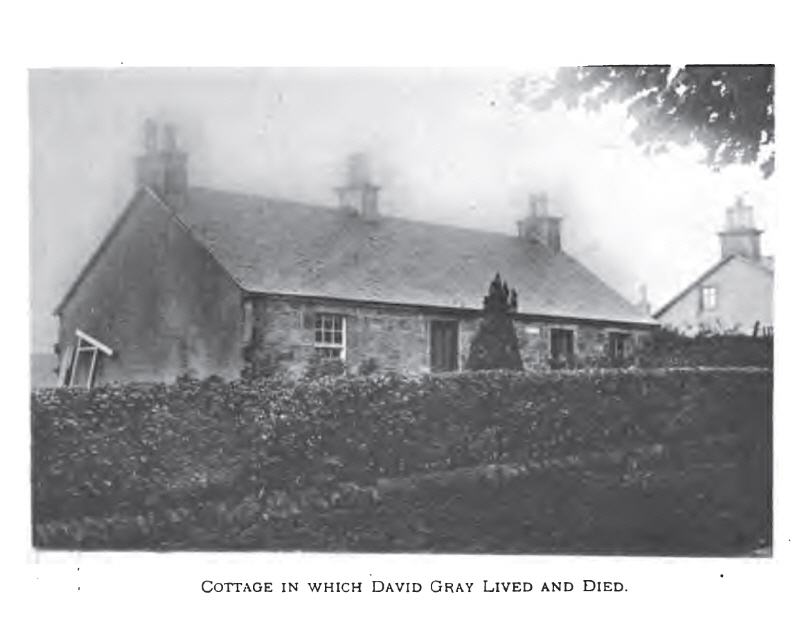 |
|
David Gray, Poet.* EVERY town and village of Scotland has produced its poet, but not every one can boast, like Kirkintilloch, of a son who wrote such pure English verse as that of David Gray, the author of “The Luggie,” a work which has raised his — * We are indebted for the articles on David Gray and Walter Watson to Mr. James Blackwood. — 308 name among the greatest of minor poets of Britain, and which must be a never-dying one to those who value genius. This Monument 311 But, like Burns, he left his own epitaph, and who can say it is not a beautiful one?— Below lies one whose name was traced in sand, DAVID GRAY. Thus lived and died one who left a few words only behind him; but these have been described as “the truest, purest, tenderest lyrical note that has floated to English ears this half century.” That impulse which all beauty gives the soul, It would be too much to say that the world has listened to him, but it is no exaggeration to state that those who have heard have appreciated. He then proceeds to describe scenery and circumstances pertaining to the 312 seasons of the year in an inimitable manner. The winter scene of curling every one who knows the game will admit is realistic enough:— Now underneath the ice the Luggie growls, The attachment of youthful, boyish friendship is beautifully described:— We sat together on one seat, These are but glimpses into the beauty of the poet’s mind, and at the close he asks you if you note any failings in his work, to Forgive youth’s vagaries, want of skill, 313 This tribute to the memory of David Gray would be incomplete without giving the reader a copy of a sonnet which is one of a number he wrote, entitled, “In the shadows.” His description of a wet October day will indicate how keenly he observed nature:— October’s gold is dim—the forests rot, |
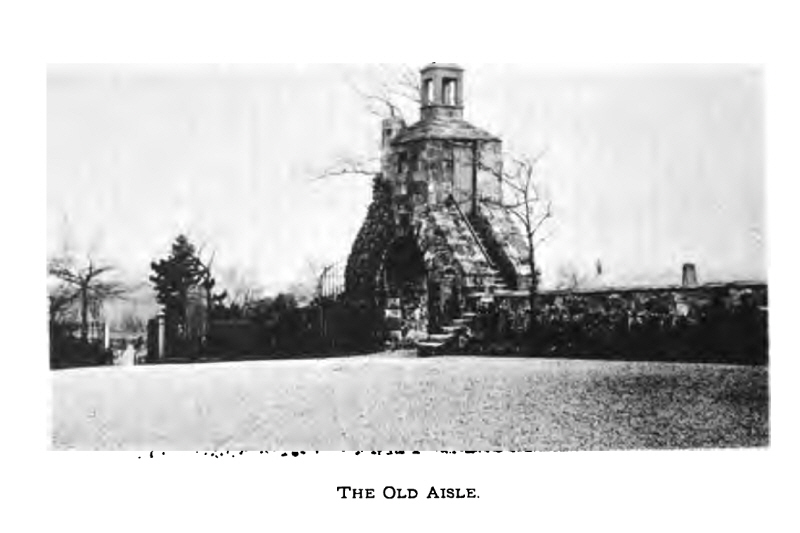 |
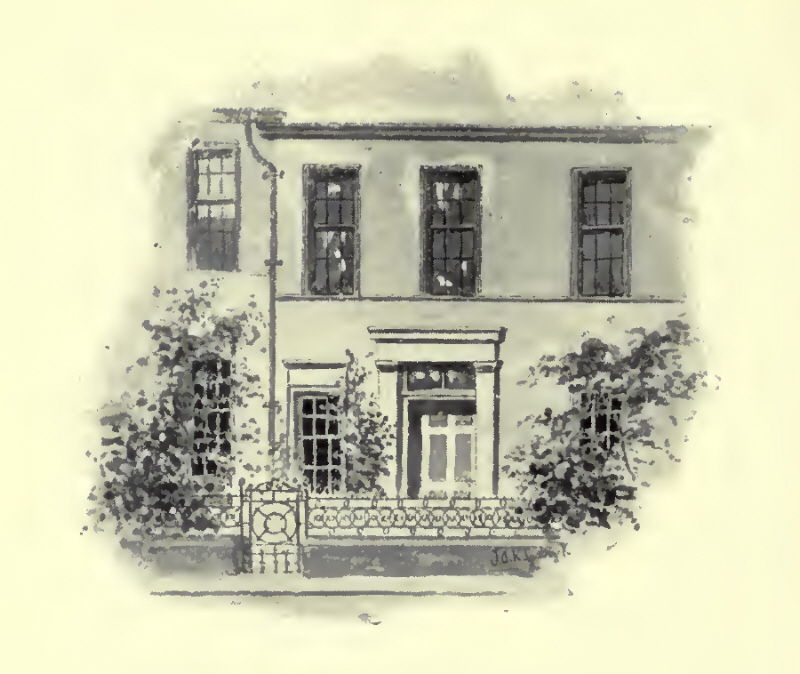 |
|
FORTY years ago a group of earnest youths in Glasgow, then merely boys, made up their minds to be famous. One of them, David Gray, declared that the dream of his life would not be fulfilled, if his fame did not equal, at least, that of Wordsworth; another, Robert Buchanan, wrote to Philip Hamerton “I mean, after Tennyson’s death, to be Poet-Laureate”; like aspirations, if less openly expressed, fluttered into the day-dreams of William Black; and infinite hopes, longings, and ambitions, crowded upon the view of Charles Gibbon as he sat, 253 far into the morning, in his little upstairs bedroom plying his busy pen over some snatches of romance with which he thought to astonish the whole novel-reading world. |
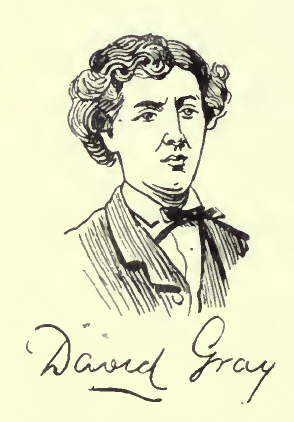 |
|
Poor Gray! his life was a real tragedy. Somehow it seems to have been all wrong. Save by a few friends, who loved and cherished him to the very end, he was strangely misunderstood. It was never meant that he should be a school-master, and accordingly, when for a time he acted as pupil-teacher under the late Matthew Aitken in Rutherglen School, he would return home to his lodging in the Calton, after the worry of a day’s “schooling,” nervous and agitated. His temperament was quite unsuited for the work. It was too delicate, too highly strung. — * See illustration on page 252. — 256 enticed Gray and himself to London. For a time afterwards there were no smoking-caps or easy-chairs for Bob. In his delightful recollections of David Gray,* Buchanan tells how one day in May, 1860, he came to him and said with eyes full of hope and exultation— — * “David Gray, and other Essays, chiefly on Poetry,” 1868. — 257 of stairs to his own “dear old ghastly bankrupt garret” at 66 Stamford Street. Then, after many attentions at the hands of Monckton Milnes and Sydney Dobell, poor Gray was sent home to die. Buchanan came north to Glasgow to see him in April, 1861, and found the boy-poet calm and resigned. “I am dying, Bob,” he said to his old friend, and alas! it was too true. Through the summer, however, he lingered, but the winter came, and with the close of the year he passed peacefully away. |
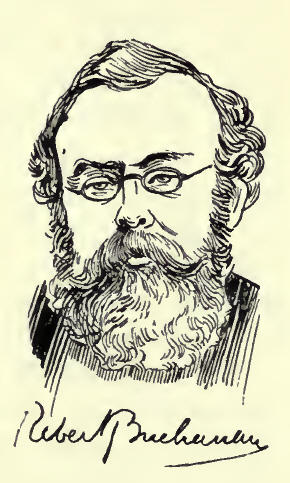 |
|
William Black was another youth who went to London in pursuit of fame, but Black, in spite of his flirtations with the Muse, was of a more practical turn of mind than Buchanan or Gray, and a lad of great zeal in everything he turned his mind to. When in Glasgow he was enthusiastic in almost every kind of sport, and to his unwavering devotion to the gentle art of angling are due the glowing descriptions of salmon-fishing that distinguish his novels. He was born in the same year as Buchanan (1841), and first saw the light in a 258 high building in Trongate, just opposite the Tontine.* Schooling over, he soon took to scribbling verse, and from his boyhood was fond of pictorial description, always giving full sway to his panoramic imagination in his writings. Verse he could not resist, and when Dr. Hedderwick or Mr. Freeland declined his poems, he just wrote a descriptive article and ingeniously worked the verses in! He was a great worker, and as a journalist his industry was prodigious, so much so that when the little circle of ambitious Glasgow youths found themselves struggling together in London, Black, it is said, would be up with the muffin man, and have an article ready for the Press long before his mates were out of bed. — * In reply to a query of mine as to the number and flat of this house, Mr. William Black wrote: “I am sorry I cannot give you the number in the Trongate, but certain I am I was not born ‘in the top flat.’ That would have been altogether too poetic!” — 259 reckoned on the fingers of both hands. Still it was a serious effort, and he went off to London with the consciousness that he was already a published author. |
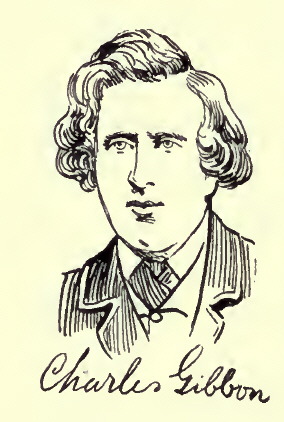 |
|
261 After a period of service under old Peter Mackenzie, young Gibbon went to Dumfries as a reporter, and ultimately, like his three fellow fortune-hunters, he found himself on the high road to London. In like manner with the rest, Gibbon endured the hardships of impecuniosity, for his half-crown (to arrive in London with more than half-a-crown seems to be considered discreditable!) could not last very long even reckoned by its equivalent in muffins, to say nothing of the irresistible temptation to squander it recklessly upon a rasher of bacon. Cold, cheerless lodgings in some two-pair back, with occasional dinnerless days and supperless nights, were the lot of Charles Gibbon in common with his companions.* For him, however, the lights of London never grew very dim, and if there were times when he feared that they might fail, there were times also when they flared up very brightly. — * “Neither Black nor Gibbon,” Mr. Robert Buchanan wrote to me, “ever knew Gray. Gibbon came to London when Gray had gone home to die, and lodged with me at 66 Stamford Street, Blackfriars. We were sleeping together the night Gray died, and I woke Gibbon and said to him, ‘David Gray is dead.’ This was confirmed the second morning afterwards.” — 262 Standard Theatre, London, both Buchanan and Gibbon appearing in the cast.* From this onward the youths seem to have fared very well. Buchanan had much greater versatility than Gibbon, and poems, essays, novels, and plays were speedily called into existence by the talisman of his pen. Gibbon, however, confined himself to fiction, and the score of novels to which his name is attached went very near placing him among the foremost members of his craft. At his death seven years ago, an able writer in the Athenæum declared that “Auld Robin Gray” and “For Lack of Gold” displayed “that sympathetic insight which, in its highest development, was the secret of Scott’s mastery of detail.” And the same critic added this interesting comment, which is peculiarly appropriate to the Kailyairders of to-day—: In these days, when fashion is doing so much to induce all sorts and conditions of writers to try their hands at something Scotch, one cannot help looking back with a certain amount of fond regret to one of the two or three masters of their native tongue who were also true exponents of the nature of their countrymen. Two or three are with us yet perhaps five but the circle is distinctly impoverished by the loss of Charles Gibbon. — *An interesting recollection mentioned by Gibbon’s father is Charlie’s appearance at Dunlop Street Theatre, Glasgow, as Meg Merrilees, in a performance of “Guy Mannering” for the benefit of the Macdonald family. This would be about 1862. — 263 It was on the homely seaboard of East Anglia that he spent his closing days, and thence in his last illness he often looked back upon his fateful journey to London when he first left his old home. What a multitude of young provincials have trodden that same highway even since then! Many, no doubt, like Buchanan, Black, and Gibbon, have gone forth to distinction, and have seen the lights of London burn bright and luminous at their approach, but for how many, think ye, have these lights been extinguished for ever? 264 XIX:—A POET’S CORNER. IN the midst of the great multitude of latter-day poets who have been associated with Glasgow, it is difficult to make a selection, yet impossible, without weariness, to deal with all. The swift and tragic end of David Gray robbed the company of Glasgow bards of a poet of great promise. Remember his own words: “I tell you that, if I live, my name and fame shall be second to few of any age, and to none of my own. I speak this because I feel power.” This was extraordinary language for a boy, but Gray was no ordinary youth, and, had he lived, his poet- voice must have been heard among the best bards of the day. How sad, how woefully sad, was his end! 265 The day before his death (December 2, 1861), he had been brought the proof-sheets of his poem, “The Luggie,” and his eyes had kindled with a beautiful light as he beheld the printed page. It was “good news,” he said, though, alas! it seemed but a vanity to him now, and he passed tranquilly away in his old home, almost within hearing of the ripple of the Luggie, that sweet, sparkling stream among the trees which had. first inspired his pen to poesy. It was but a short life that Gray lived, and it was full of pathos—pathos almost as deep as the tragedy of Chatterton or of Tannahill. ’Twas not a life, was the beautiful epitaph he suggested for himself. Why were not these lines chiselled on his tombstone in the Auld Aisle Burial-ground at Merkland? It puzzled us, _____
10. Memoir by Henry Johnston
. . . — * This lady wrote to Gray four days before his death: “My dear Mr. Gray, I have heard from Mr. Macmillan this morning. He speaks highly of the poem, and expresses his readiness to undertake its publication. He says the MS. will form a volume like Edwin of Deira, and the enclosed is a specimen page, sent with the printer’s estimate. I cannot resist the impulse to send it on to you, because I think it will give you so much pleasure to see even this small portion of your work already in the form in which I hope before long we may see it published. _____
11. Chapter Ten: V-VI
. . . VI In January 1838, a year which Richard Monckton Milnes had spent finding his feet in the House of Commons and in the drawing-rooms of London, a Mrs. Gray, wife of a young hand-loom weaver living eight miles from Glasgow, gave birth to her first child, a son. Called David after his father, the boy was the eldest of eight children whom the Grays reared in a tiny, damp, one-storied cottage with a slate roof at Kirkintilloch. The cottage had three rooms—the work-room, devoted to the looms; the kitchen, paved with stone; the cabin-like bedroom with one piece of carpet on the floor. The ten members of the Gray family slept in ‘extraordinary mural recesses’ and lived and ate in the kitchen; the children 221 played along the banks of the local stream, the Luggie, and on the nearby Campsie fells. Seven Grays, boys and girls alike, were brought up to follow their father’s trade; of their first-born, David, the Gray parents, dour and undemonstrative but high-minded and well-intentioned, hoped for greater things. David’s exceptional powers of concentration and his general intelligence had persuaded them to back him in his wish to go to Glasgow University, whence he returned to work as a pupil-teacher in his own home town. By 1859, when David was twenty-one, his time as pupil-teacher was up. His own conscience (and his parents) clearly indicated that he must earn his living, and here the cleavage between David Gray and his relatives began: for while they had secretly clung to the conviction that he was destined for what seemed the highest of all offices to their simple, earnest minds, that of Minister in the Church of Scotland, David was equally convinced that he was born to be a poet—and not merely a great poet, but the greatest poet of his generation. He had for some time been contributing verses to The Glasgow Citizen under a pseudonym, and he was always working upon the draft of the long Thomsonian poem on which his reputation rests. Long after his son’s death, Gray’s father confided to an enquirer that the family had often wished The Luggie ‘in the fire’; but with an absolute tenacity of purpose David Gray continued to work at his poetry, postponing or evading any decision about the Ministry. His tenacity was that of a fanatic; had he lived longer and developed his remarkable gift we might to-day recognise it as that of a genius. ‘I am a poet: let that be understood distinctly,’ he once wrote to a stranger; and according to Lord Houghton, who has described him as strongly resembling a cast of Shelley in his youth, David Gray’s face, of which no portrait or photograph exists, bore the stamp of the poet. Light, well-built, with a slight stoop, black curling hair and dark lustrous eyes, Gray had a mouth that struck observers as ‘feminine’ and the skin and complexion of a beautiful girl. By temperament he was hysterical, but self-confident: bashful in person, he was ‘bold’ on paper, writing long letters in which pride, despair, self-pity, the conviction of genius and requests for money alternated one with another. You promised to read my poem. I travelled from Glasgow to give it to you, and to push my fortune. Looking two days before me, I see starvation. Shall I send or bring it? I know that you do not wish to be troubled with people of my sort coming about you: that is what makes me ask. Whatever you do—do it quickly in God’s name. He followed this up with a personal visit, or more probably he had brought the note by hand. 222 I was dismayed at this unexpected result of my advice [wrote Houghton in his Introductory Note to Gray’s posthumous poems], 1 and could do no more than press him to return home as soon as possible. I painted as darkly as I could the chances and difficulties of a literary struggle in this great city. . . . ‘No—he would not return.’ I determined in my own mind that he should do so before I myself left town for the country, but at the same time I believed he might derive advantage from a short personal experience of hard realities. He had a confidence in his own powers, a simple certainty of his own worth, which I saw would keep him in good heart and preserve him from base temptations. He refused to take money, saying he had enough to go on with; but I gave him some light literary work. The work was copying, and Milnes also arranged for him to act as a part-time amanuensis to Laurence Oliphant, just back from Tokyo. Gray called again, and Milnes and he ‘went over’ some of his writing together. When Milnes told him he was ‘an undeniable poet,’ Gray felt intoxicated, but when his new friend tried to get Thackeray to print The Luggie in the Cornhill, it was refused, and Gray found the disappointment hard to bear. About this time Milnes seems to have presented him with a copy of his Life of Keats. Gray devoured this book, and suddenly perceived a dangerous similarity between his own situation and that of John Keats; shortly afterwards he arrived at Upper Brook Street ‘apparently under the influence of violent fever,’ saying that (being ‘insufficiently clothed’) he had caught cold from the rain in Hyde Park, and had fallen ill, but had not wanted to bother anyone. Milnes immediately sent him back to his lodgings, despatched the excellent Dr. Tweed to look after him, and frequently visited him himself with food and drink from Upper Brook Street, his only regret being ‘that imperative circumstances’ did not permit him to instal the boy in his own house. It was soon clear that David Gray’s lungs were affected. On learning this, he knew himself to be doomed. — 1 The Luggie and Other Poems by David Gray, appeared after the poet’s death in 1862, with a Memoir by James Hedderwick and a ‘prefatory notice’ by Milnes. The poems were again published in 1874. — 224 trying to arrange through his Torquay aunts, and at his own expense. In the meanwhile, Gray had been back to Kirkintilloch and had told his father that Milnes had said things to him that had been ‘worth coming to London for alone’: ‘You told me once that to be a brave man was above being a poet,’ he wrote. Like all abnormally sensitive people, poor David Gray was difficult to handle, but Milnes never flinched. He noticed that Gray’s boastful ‘over-confidence’ gave way when ‘he knew he was really appreciated and cared for,’ and that he began comparing his own achievements with those of others, and to draw lessons therefrom. I know how easy a thing is to give counsel, and how poor is consolation [Milnes wrote most feelingly to his young friend]; but still I must expect you to be brave and resigned. . . . There is much in this world far sadder and crueller than the thought of leaving it; and the old Greeks counted every man happy who died young. ‘The Torquay venture,’ Milnes’ well-intentioned plan to have David Gray admitted as a patient at the ‘water-hospital’ there, had ended lamentably. After a few hours in the place Gray had ‘escaped’ to a Torquay hotel, where he kept to his room in a state of hysterical fear lest the hospital officials should ferret him out and drag him back to their verminous wards. Those who have formed the habit of regarding the Victorian period with nostalgia, and of investing it with all the virtues of a Golden Age, should read extracts from the long letter in which David Gray described to his benefactor the reasons for his flight from the water-hospital at Torquay. Before perusing this letter, which is dated January 1861, it is instructive to recall that since 1853 Torquay had been the chief seaside resort of wealth and fashion in this country, comparable to Brighton in the days of the Regency. Huge villas—the largest of them being Baroness Burdett-Coutts’ palace, ‘Ehrenburg’—had been constructed; the yachts of foreign royalties lay out on the smooth waters of the bay; London carriages, carriage-horses, powdered footmen and coachmen in livery were transported from the capital for the Torquay season, as well as London’s favourite clergymen, to preach. Yet in the hospitals of this sophisticated and salubrious town there prevailed conditions of filth and squalor that would have surprised almost every contemporary except perhaps Milnes’ friend Miss Nightingale. 225 Now that my brief struggle for life is past [David Gray began his letter from Kirkintilloch], and I am once more at home, let me write you this last letter. And let me explain to you why I am here. After receiving a note from Mr. Pollard the Hony Secy saying that I could get into the Hospital immediately, I started next day by the earliest train, and arrived in Torquay at 4 o’clock PM. Taking a cab I drove to the Institution. . . . Driving along the seashore I was most happy. I looked forward to five months of agreeable companionship and easy labour with my book. . . . Arriving at the door of the Hospital I was met by a nurse who . . . led me without saying a single word thro’ long not-very-clean corridors; then thro’ a lobby where the clothes of the patients were stuffed in open boxes and ticketed as in a pawnshop. How it smelt! Then thro’ a large room with 8 or 10 beds in it: through another with 6 or 8 beds and pointing to one at the corner said ‘This is your bed.’ I asked if it was not necessary for me to see the physician or the matron. It was not. Having taken off my overcoat . . . I enquired where I should go now. She said she would take me where ‘the rest’ sat, and repassing the same lobby and corridor I was introduced to my fellow sufferers—23 of them. I could have borne everything but what I saw here. Not one of them was clean. They all sat round a fire, and loud empty laughter was heard at every vulgar joke. One man about 30 years of age was roasting some piece of meat with a spit and as I entered held it up to me with some rude remark and then the loud laughter rose again. Two young fellows were evidently very far gone, and they were assisting each other to walk across the room; while their poor weak attempts at walking were greeted with loud shouts of ‘Quick march!’ There were no easy chairs for persons in this condition—no quiet corner to think of home . . . no comfort but sleep—and how much of that would they have? I sat among them for some time, but the constantly recurring thought that I was to live here was too much and my heart overcame me till I fainted. When he recovered he appealed to a nurse, and then to the Matron, for permission to sit in a room alone for an hour or two till he felt better—a request roughly refused. Gray next demanded to see the Honorary Secretary who curtly sent him about his business. ‘They are all poor uneducated men here,’ the Matron remarked. If he stayed, she told him, he must behave like his fellows. Waiting till the Matron’s back was turned, he fled from the hospital, to an hotel room in the town. On returning from our drive [wrote Milnes’ aunt Caroline, who, with her two sisters, still lived at Fryston Lodge, Torquay], I find a note enclosing this wild epistle from David Gray. What steps are to be taken to maintain him, as he writes from the expensive Hotel below, where he was before & expressed so little thankfulness for the 226 attentions & very small charge they made? The man can scarce be in a sound state of mind . . . probably he would not be a pleasant inmate anywhere. The Misses Milnes were known throughout Torquay for their persistent church-going and their zeal in good works, but excellent though these ladies were they were not equipped to understand the neurotic behaviour of Richard’s protégé. To them David Gray appeared as the ungrateful working-class recipient of their brother’s bounty. No doubt they felt that Gray should have stayed in the water-hospital, and that Richard Milnes had done enough. What would David Gray have done without you? [a friend wrote to Milnes in January 1864]. Is it not a deep satisfaction to you to feel that you contributed to that poor boy’s happiness & that he blessed you when he died? If you had been Horace Walpole, he might have met the fate of Chatterton. Milnes, however, reproached himself for not having done more for Gray earlier on: he told his wife that had he thought of buying him an overcoat on his first trip to London, the boy might never have caught consumption at all. This Monument of Affection, Admiration, and Regret, is _____
Notes on David Gray - continued (ii)
|
|
|
|
|
|
|